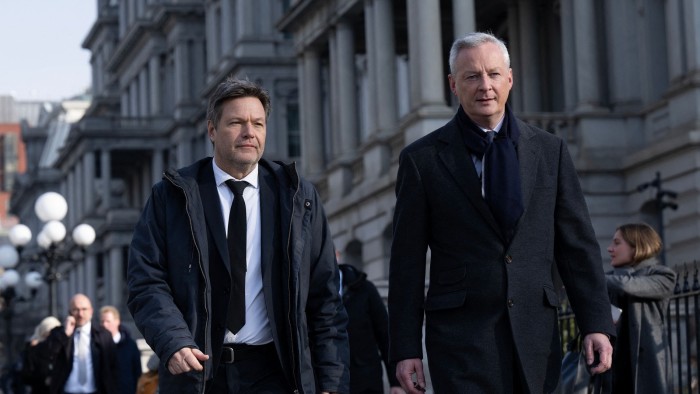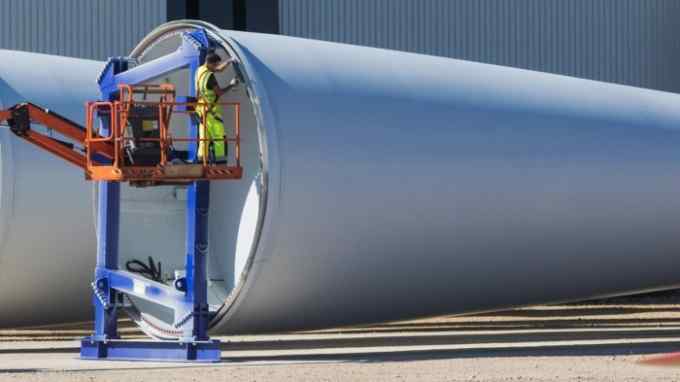US-Europe trade tensions heat up over green subsidies

Roula Khalaf, Editor of the FT, selects her favourite stories in this weekly newsletter.
Joe Biden’s administration hopes to unleash a green revolution by offering hundreds of billions of dollars in subsidies to clean energy companies, but the US president’s flagship legislation also threatens to spark a fresh trade war.
The Inflation Reduction Act, which was passed by US Congress last summer, earmarks around $369bn in grants, loans and tax credits for the rollout of renewable energy and clean technologies across the US.
Since the law passed, $90bn of investment has been committed to clean energy projects in the country, ranging from solar panel factories to electric vehicle plants and battery hubs.
And, across many sectors, companies are rewarded for building equipment nationally, or sourcing components and critical minerals from the US or countries that the US has a free trade agreement with.
As a result, the law has alarmed US trading partners, including Europe and Japan, who fear they will lose out to the US on new jobs and business investment. French President Emmanuel Macron said recently that the new climate law threatened to “fragment the West”.
European Union officials have also accused Washington of discriminating against European companies and breaking global trade rules overseen by the World Trade Organization — particularly in the electric vehicle sector, where companies score the full tax credit if they manufacture cars in North America.
David Kleimann, a trade expert and visiting fellow at Bruegel, the European think-tank, says that, while the IRA is a welcome piece of climate legislation, it also includes “trade-distortive subsidies” including provisions to manufacture in the US, which are prohibited under World Trade Organization rules.
In response, the EU is working on its own raft of green subsidies, beginning with proposals to loosen up the bloc’s strict state aid rules. However, corresponding subsidies on either side of the Atlantic have prompted concerns that companies will “subsidy shop” — playing governments against each other and locating their businesses in the most lucrative domain.
Earlier this month, French finance minister Bruno Le Maire and German economy minister Robert Habeck staged a rare joint visit to Washington, DC, meeting with US trade representative Katherine Tai, commerce secretary Gina Raimondo and Treasury secretary Janet Yellen.
Habeck said that, along with conveying the “European view of the problems” at the meeting, the pair had discussed concerns that the IRA could prompt a “bidding war on subsidies”. Le Maire said they had all agreed on the need for “full transparency about the level of subsidies and tax credits” awarded to companies.
But some analysts have estimated that the overall level of subsidies awarded under the US legislation could be much higher than forecast by the Congressional Budget Office.
“What’s fascinating about the structure of these subsidies and tax credits is that how big they are depends entirely on how responsive the consumers are, how responsive the companies are and what the economic conditions are,” says Chad Bown, of the Peterson Institute.
“We’ve got a range of estimates of how big the subsidies could be, depending on how much we think consumers and companies [will] choose to access them.”
There are also concerns that subsidies on both sides of the Atlantic could distort industries and potentially lead to overcapacity.
Bown says an excess of renewable energy could be good thing. “It’s hard to imagine having too much clean energy,” he says. “Even if there was too much for the US market, [and] they had to dump it out there to the rest of the world.”
With more clean energy available, it could reduce demand for oil, which he suggests would be a positive result.
In addition, US officials argue that clean energy innovation and investment in the country would bring advantages to Europe and elsewhere by driving down clean energy costs and opening up opportunities for other investors.
“The challenge of dealing with the climate crisis requires . . . a transformation of the global economy on a size and scale that’s never occurred in human history,” said John Podesta, the White House official in charge of rolling out Biden’s green subsidy package, last week. “So there’s plenty of room for everybody to participate in that.”

Comments